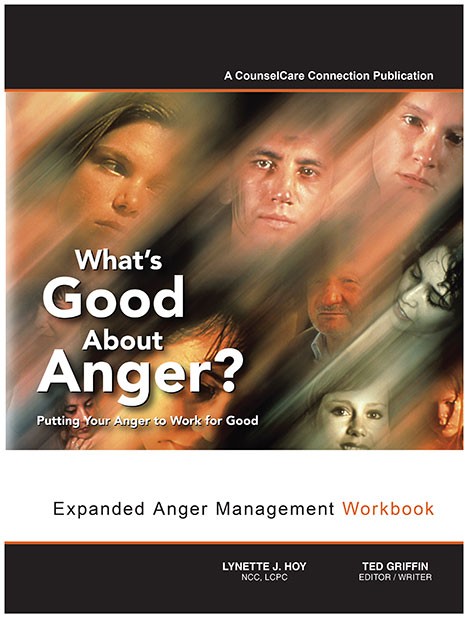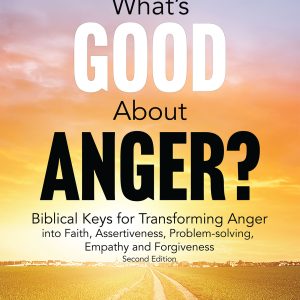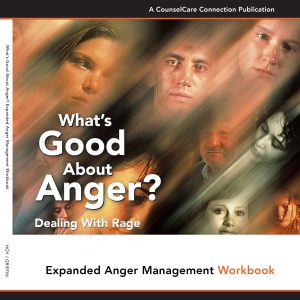Do you want to teach effective skills for managing anger to a group or class? This new Group Anger Management Program includes all the tools you need for helping people learn how to control anger – transforming it into assertiveness, problem-solving, empathy, conflict resolution and forgiveness! Includes a lesson on dealing with rage with rage inventories.
Teach people how to achieve their goals by changing ‘hot self-talk’ to ‘cool talk’, applying relaxation skills, learning ‘Thinking Ahead’ strategies, how to handle difficult people and difficult situations with time-outs, empathy and the ASERT skills. These lessons can be modified for 8-12 week groups!
Includes:
-
- 17 week/lesson Leader’s Guide;
- Tools for group leaders: Video on flash drive (65 min) and power point presentation of program on CD
- (15) What’s Good About Anger? Expanded Book/Workbooks – 17 Lessons (2021)
WHAT’S GOOD ABOUT ANGER? Dealing with Rage Expanded 17-Lesson Anger Management Book/Workbook (2021).
Now includes over 17 lessons covering the best anger management strategies from the book; questions and practical scenarios for real life application.
Most people believe that anger is a negative emotion from which no good can come. Many people think that anger
should not be expressed and that such feelings are wrong. This expanded workbook explores the emotion of anger and how anger—which is a part of the human experience—can be put to work for good. Includes: practical tools, “what if?” real life situations; assertiveness examples; cognitive strategies and positive skills for personal and relational change.
Learn about:
-
- How to Rate Your Anger and Progress
- Triggers for Anger
- Anger’s Many Faces
- The Power of Anger
- When Anger is Good
- Defusing Anger by Managing Stress
- Handling Anger Effectively
- Anger and Assertiveness
- Managing Conflict
- Turning Anger into Forgiveness
- When to Take a Break
- Cognitive Distortions and Changing Thinking
- How Emotional Intelligence Impacts Anger
- Choosing Behavior Alternatives
- Preventing and Interrupting Aggression
- Stop Blaming – Accept Responsibility
- Facing the Consequences of Anger
- Dealing with Rage
Here’s a sample of the leader’s guide:
What’s Good About Anger? Seventeen Session Leader’s Guide for Community Groups (session one) by Lynette J. Hoy, NCC, LCPC, CAMS-V
SESSION ONE: Anger: friend or foe? Introduction to the problem and types of anger.
Goal: To define anger, how it affects people and relationships. To begin to explore triggers for anger and foundational teachings about anger.
Session Plan:
Welcome participants and introduce yourself. Have the members of the group introduce themselves. Present Rationale: Explain the purpose of learning anger management: To increase self-control (control over own behavior/thoughts). To handle conflict and provocation more effectively. Most importantly: Learn to put your anger to work for good!
The What’s Good About Anger? anger management course and group employs the these major areas and anger control interventions:
- Understanding the dynamics of anger,
- Identifying triggers and underlying causes,
- Logging scenarios,
- Applying new skills such as: time-outs, prayer,
- Addressing issues with assertiveness,
- Establishing a plan of action,
- Learning to problem-solve,
- Getting guidance from a counselor, coach or mentor when needed,
- Changing self-talk and cognitive distortions,
- Turning anger into forgiveness,
- Applying Stress management and Conflict management skills,
- Developing Emotional Intelligence and Empathy skills
- Defusing Aggression
- Taking Responsibility
- Dealing with and Preventing Rage
Introduction and Support Group Guidelines: Review pages in the book covering the introduction, assignments, and Support Group Guidelines.
1. Read the foreword found in the book.
2. Introductory Questions: What brought you to the group? What do you hope to learn?
What pictures or words come to mind when you think of anger?
How would you define anger?
3. Survey: Provide some time to complete a portion of the survey in the book or workbook. Ask participant’s to total their scores from questions one & two.
Present and teach: Chapter Two: Anger’s Many Faces.
Anger, though potentially harmful, can be transformed into a positive force accomplishing great good in our lives. Ted Griffin and Lynette Hoy
Teaching points and insights:
The first session is critical to helping participants, clients and students gain an overview and understanding of the emotion of anger- what it is, that it is normal, often harmful but, can be expressed in healthy ways. Many participants may be court-ordered to take the class or sessions so, it is important to try to win them over helping them to accept the classes and see that they can benefit from the information and curriculum. How can you accomplish this? Start out with presenting everyday examples of anger – yours, class members, examples from society and the book and treating each individual with respect. Have participants take a portion of the survey and share the results and discuss a scenario in which they became angry. Ask people to share why they have come and what they hope to gain from the classes. Those members who do share may motivate and help other’s who are angry about being there. The following questions may help bring out some of the quieter more distant members and apply the course material.
Begin discussion about the benefits of transforming anger both personally and relationally.
Discussion:
…How have you experienced anger in your family?
…Can you identify with Lynette or Ted’s experiences?
…What kinds of situations most often make you feel angry?
…Do you see anger as a friend or foe? Why? Write out one situation you wnat to improve.
…What might happen if you acknowledged your anger?
…How do you express your anger? What is your typical response to feelings of anger?
…What have been the consequences of your anger? Descibe.
…How has your anger affected your life and relationships?
…What is your reason for coming to the group? Write it out.
…How will expressing your anger in healthy ways benefit you?
…Write out one anger management goal you would like to achieve in your book or workbook.
Foundational Insights:
“Anger is an energy or force which is often harmful. Anger is caused by feelings of helplessness and the need to control situations, people and consequences. Anger –- when expressed in a healthy way — can foster personal growth and significance, improving relationships and changing lives.”





